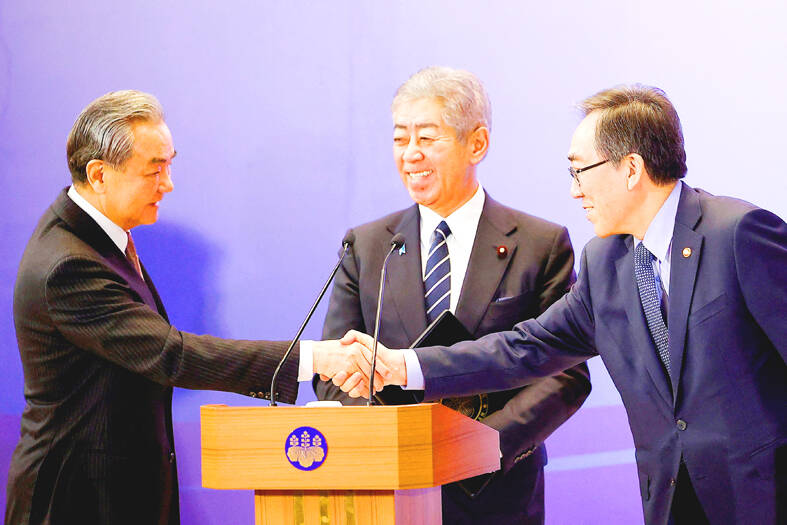The top diplomats from Japan, China and South Korea yesterday met in Tokyo, seeking common ground on East Asian security and economic issues amid escalating global uncertainty.
“Given the increasingly severe international situation, I believe we may truly be at a turning point in history,” Japanese Minister of Foreign Affairs Takeshi Iwaya said at the start of the meeting with Chinese Minister of Foreign Affairs Wang Yi (王毅) and South Korean Minister of Foreign Affairs Cho Tae-yul.
The three agreed to accelerate preparations for a trilateral summit in Japan this year that would also include talks on how Tokyo, Beijing and Seoul can tackle declining birthrates and aging populations, Iwaya said in a joint announcement after the meeting.

Photo: Reuters
The first gathering of the countries’ foreign ministers since 2023 was held as US President Donald Trump upends decades-old alliances, potentially opening the door for China to forge closer ties to countries traditionally aligned with Washington.
“Our three nations have a combined population of nearly 1.6 billion and an economic output exceeding US$24 trillion. With our vast markets and great potential, we can exert significant influence,” Wang said.
China wants to resume free-trade talks with its neighbors and expand membership of the 15-nation Regional Comprehensive Economic Partnership, he added.
However, deep divisions remain. Beijing is at odds with Tokyo and Seoul on several key issues, including its support of North Korea, its intensifying military activity around Taiwan and its backing of Russia in its war with Ukraine.
US allies Japan and South Korea, which each host thousands of US troops, share Washington’s view that China — the world’s second-largest economy — poses a growing threat to regional security.
Cho said he had asked China in the meeting to help persuade North Korea to abandon its nuclear weapons.
“I also stressed that illegal military cooperation between Russia and North Korea should stop immediately, and that North Korea should not be rewarded for its wrongdoings in the course of bringing about the end of the war in Ukraine,” he added.
Iwaya met separately with his Chinese and South Korean counterparts, including the first high-level economic dialogue with Beijing in six years.
A key issue for Tokyo in the talks with Beijing is a ban on Japanese seafood imports imposed by China after the release of wastewater from the destroyed Fukushima Dai-ichi nuclear plant.
Iwaya said he confirmed a commitment by China made in September last year to allow imports of marine products and also asked about expanding imports of Japanese agricultural products, including beef and rice.
“I emphasized that it is important to prioritize resolving those issues that can be addressed early,” Iwaya told reporters after the meeting.

INVESTIGATION: The case is the latest instance of a DPP figure being implicated in an espionage network accused of allegedly leaking information to Chinese intelligence Democratic Progressive Party (DPP) member Ho Jen-chieh (何仁傑) was detained and held incommunicado yesterday on suspicion of spying for China during his tenure as assistant to then-minister of foreign affairs Joseph Wu (吳釗燮). The Taipei District Prosecutors’ Office said Ho was implicated during its investigation into alleged spying activities by former Presidential Office consultant Wu Shang-yu (吳尚雨). Prosecutors said there is reason to believe Ho breached the National Security Act (國家安全法) by leaking classified Ministry of Foreign Affairs information to Chinese intelligence. Following interrogation, prosecutors petitioned the Taipei District Court to detain Ho, citing concerns over potential collusion or tampering of evidence. The

‘FORM OF PROTEST’: The German Institute Taipei said it was ‘shocked’ to see Nazi symbolism used in connection with political aims as it condemned the incident Sung Chien-liang (宋建樑), who led efforts to recall Democratic Progressive Party (DPP) Legislator Lee Kun-cheng (李坤城), was released on bail of NT$80,000 yesterday amid an outcry over a Nazi armband he wore to questioning the night before. Sung arrived at the New Taipei City District Prosecutors’ Office for questioning in a recall petition forgery case on Tuesday night wearing a red armband bearing a swastika, carrying a copy of Adolf Hitler’s Mein Kampf and giving a Nazi salute. Sung left the building at 1:15am without the armband and apparently covering the book with a coat. This is a serious international scandal and Chinese

Seventy percent of middle and elementary schools now conduct English classes entirely in English, the Ministry of Education said, as it encourages schools nationwide to adopt this practice Minister of Education (MOE) Cheng Ying-yao (鄭英耀) is scheduled to present a report on the government’s bilingual education policy to the Legislative Yuan’s Education and Culture Committee today. The report would outline strategies aimed at expanding access to education, reducing regional disparities and improving talent cultivation. Implementation of bilingual education policies has varied across local governments, occasionally drawing public criticism. For example, some schools have required teachers of non-English subjects to pass English proficiency

TRADE: The premier pledged safeguards on ‘Made in Taiwan’ labeling, anti-dumping measures and stricter export controls to strengthen its position in trade talks Products labeled “made in Taiwan” must be genuinely made in Taiwan, Premier Cho Jung-tai (卓榮泰) said yesterday, vowing to enforce strict safeguards against “origin laundering” and initiate anti-dumping investigations to prevent China dumping its products in Taiwan. Cho made the remarks in a discussion session with representatives from industries in Kaohsiung. In response to the US government’s recent announcement of “reciprocal” tariffs on its trading partners, President William Lai (賴清德) and Cho last week began a series of consultations with industry leaders nationwide to gather feedback and address concerns. Taiwanese and US officials held a videoconference on Friday evening to discuss the